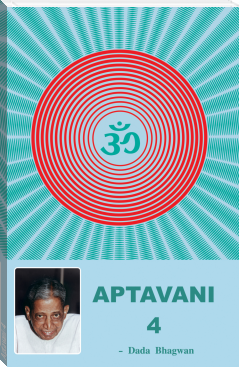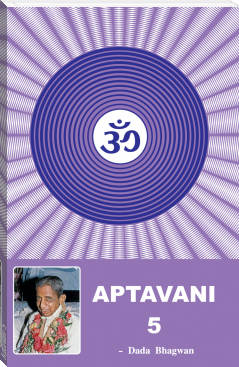Aptavani-2 by Dada Bhagwan (interesting novels to read .txt) 📕

Read free book «Aptavani-2 by Dada Bhagwan (interesting novels to read .txt) 📕» - read online or download for free at americanlibrarybooks.com
- Author: Dada Bhagwan
Read book online «Aptavani-2 by Dada Bhagwan (interesting novels to read .txt) 📕». Author - Dada Bhagwan
Dr. Niruben Amin
PREFACE
By Dr. Niruben Amin
No one except the One who is fully enlightened can expound the nature of the worldly illusion, which has prevailed for infinite life times. Such completely Enlightened Ones had exposed the truth thousands of years ago however, that truth has been covered up in these terrible times of Kaliyug. What is more, such fully enlightened beings do not exist in the time cycle of Kaliyug. Thus, it is indeed a phenomenal wonder that such a One has arisen in this era. He is the omniscient Shree ‘Dada Bhagwan’. He has given complete answers about the nature of this universe, its origin, sustenance and dissolution in only one sentence:
“The world is the puzzle itself!” - Dadashri
“The world is the puzzle itself, there is no “bapo” (father figure) who has created it.” How does the entire universe run? It world runs only by vyavasthit shakti (scientific circumstantial evidences). Now these scientific circumstantial evidences range from the gross to the subtlest. The Knower and the Seer of it all is verily and only the Omniscient one. Hence, only the Omniscient one can show us the true nature of the universe. That is why the sage Narsinh Mehta sang:
“Shrushti mandaan chhe sarva eni pere,
“The origin of the universe is beyond comprehension,
Jogi Jogeshwara kok jaaney.”
this is known by the rare Yogi and Yogeshwar (the Enlightened One).”
What devotee Narsinh Mehta meant by ‘yogis and Yogeshwars’ is that, only a rare Atmayogi (Self-realized) or an Atma-Yogeshwar (the One who is fully enlightened), can know about the beginning of the universe! All other yogis, who are yogis of the body, yogis of speech, or yogis of the mind; none of them can know this.
The following two sentences that have come forth from Dadashri in English:
1. “The world is the puzzle itself.”
2. “God has not created this world at all, there is no one as God up above.”
The above sentences depose ‘God’ from the status of being the ‘creator of the world’! These two sentences drive away the wrong notion that falsely accuses Ishwar, Bhagwan, Allah or God, as being the creator!
q What is the foundation on which this worldly life carries on, life after life? The illusion, the wrong belief of ‘I am Chandulal’ (reader insert their own name instead of ‘Chandulal’) is the basis that perpetuates the worldly life. All interactions of this worldly life occur on the foundation of the false basis of this vision, knowledge and experience. This false belief establishes (pratishtha) and creates a new causal body for the next life ( pratishthit atma), and that is the foundation on which this world exists. Dadashri is the only one who, for the first time clarifies the nature of the worldly soul (pratishthit atma).
q What is religion? That which brings forth ‘results’ is called religion. When anger, pride, deceit and greed progressively decrease and eventually become annihilated, that is religion. What is the meaning of doing darshan (devotional viewing of God), listening to religious discourses, doing introspective meditations (samayik), doing pratikramans (apology coupled with repentance) when not a single such fault decreases in one’s entire lifetime? How can that be called religion?
There are two types of religions, a relative religion and a real religion. Relative religion is the religion of the mind, religion of speech, and the religion of the body. The other religion, the real religion, is the religion of the Self, that is the religion of the Soul. Jain religion, Vaishnav, Muslim, Christianity etc., are all relative religions. The real religion, the religion of the Soul, exists in the heart of only the ‘Gnani Purush’; it cannot be found anywhere else.
Shrimad Rajchandra has said:
“Look for nothing else. Find only a Satpurush (a Self-realized person) and surrender all your bhaavs (feelings and intents) to Him and then be your Self. If after that you do not attain moksha (liberation), then come and take it from me.”
The religion of the Soul (the Self) can only be attained from the One who has become fully enlightened. There is religion elsewhere, but it is all prakrut religion, meaning religion of the non-self or the relative-self. Chanting the Lord’s name, saying prayers, doing penance, renouncing, listening to religious talks and lectures, meditation and repentance, are all prakrut religions. Where there is complete religion of the Self, there is only absolute knowledge (keval gnan) and absolute vision (keval darshan), the result of which is absolute conduct (keval charitra).
When dharma (true nature of a thing) attains its total original state, then ‘one’ (the self) verily becomes dharma-swaroop, the true nature of the Self. - Dadashri
Real religion is scientific in nature; it is not just idle talk. This is a science. The general understanding that prevails about religion is not exact religion.
“Dharma i.e. religion is when an element or anything reverts to its original nature-state.” - Dadashri
To comprehend this scientifically, gold is gold when it has the properties of gold. Polished or gold plated brass may look like gold but it can never become gold. Similarly, when an element is in its own property (state), then it has attained its own religion (dharma). Therefore, an element cannot be different from its property. When the Soul remains in its own properties (swa-bhaav i.e. its inherent state) and becomes stable in its own Self, it can be said that the Soul is in its own religion. This verily is what the omniscient Lord has called religion of the Self, (swa-dharma), the real religion.
Religion of the Self lowers one’s ego intoxication (keyf) and the common religion of the non-self increases it. When one becomes completely impartial towards one’s own self; when he ‘sees’ his every fault, even the faults at the subtlest level; then he is considered to be in real religion.
q What is the nature of the worldly life? The world is relative; it is temporary. The world is a total deception; not a single being in it is your relation. Three fourths of all the scriptures are meant for creating vairagya (dispassion) towards the worldly life, whereas only four sentences of the Gnani Purush will create vairagya in the listener!
“Allya! Have you ever seen a nanami (death)? At the time of death, are the wife, children, cars, bungalows and whatever one has earned in his life not forfeited? And what comes along for the next life? The accounts of karma he created in this life. Deceit, anger, pride, and greed (kashays), which create new causes that, will accompany him to his next life. And then he will have to start earning anew (in the next life) in order to pay off these debts!” - Dadashri
Another noteworthy point is that Dadashri would create instant dispassion for the worldly life, when he addresses the seeker in a jovial manner about the grave reality of this world.
Dadashri : How many children do you have dear lady?
Questioner : Four.
Dadashri : So where are your children from your past life at this moment?
q ‘Sansar’ (the worldly life) is derived from the word samsaran, meaning that which is constantly changing. That which is constantly changing is called the world. All embodied souls are constantly traveling in this moving path and are attaining higher life forms. Only after coming to the human form, is it possible for the embodied soul to return to a lower state (regress), but at the same time, there is also the benefit that from this human state, the embodied soul can attain the state of freedom, the final salvation!
The Gnani Purush gives a description of the world in a very simple and yet eloquent language through the following simile. The world is like a horse. People of the world are the riders of the horse. The rider believing the horse to be weak, mounts it fearfully, carrying a bale of grass on his own head. However, in the end the burden still falls on the horse! Similarly, all of you should put your burden on the horse that is the world, why carry the burden on your own mind? In the end, the horse (the world) carries it!
q Only the Gnani Purush is capable of uprooting the tree of this worldly life. How? Without touching anything else, He puts a pinch of medicine at the main root of the tree of the worldly life, so that the tree will dry out on its own and be uprooted.
q Who is a satdev? Sat means eternal, Dev means god. Is it the idol in the temple or the derasar? No. It is the one who is ‘within’ i.e. the parmatma (the supreme Lord or the supreme Soul) that resides within every living being. That verily is a Satdev. Until the realization of that supreme Soul is attained, one should accept the idol God in the temple, as the Satdev.
Who is a Sad Guru? The final guru is the Gnani Purush. But, until one meets a Gnani Purush, anyone who is at a higher spiritual level, even if it is by two degrees, can be one’s guru.
What is Sat Dharma? Dharma means religion. The agnas (spiritual instructions) of a Gnani Purush is the only sat-dharma. The words that have originated from the Gnani Purush are sat dharma, not the scriptures. The scriptures give relative religion, not the real. However until one finds the ‘real pearls’, he will have to contend with ‘cultured ones’ will he not?
With satdev, sadguru and satdharma, moksha is attained.
q What is murti dharma (idol worship)?
What is amurta dharma (worship of the formless)?
Dadashri has given a beautiful explanation of murti dharma and amurta dharma (the religion of idol worship and the religion of the worship of the formless, respectively). Many people, due to misunderstanding, do not believe in idol worship and are contemptuous towards it. This is a grave mistake. One should perform idol worship until one attains the religion of the formless; the religion of the Self. Until the Self is known, isn’t it necessary to have instruments that will help still the chit? Moreover, how can one reject the idol when thousands have done worship of the vitarag Lord in it? The one who has proper knowledge of the Self will not only, not do so, but neither will he cause any pain whatsoever through his mind, body and speech to any living being.
q The religion of idol worship is a science of India. It is a support that sustains people of a certain standard. How





Comments (0)